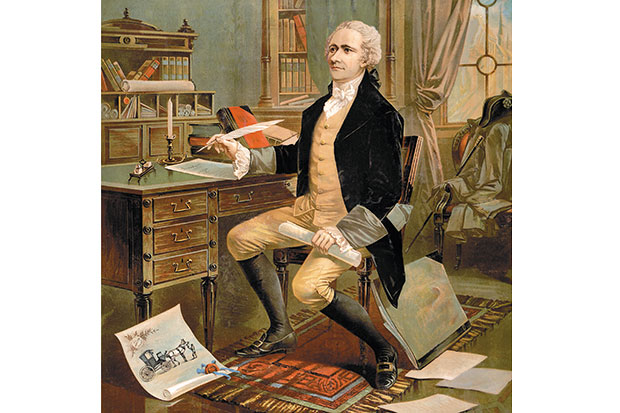To anyone complaining that American politics in 2016 is uncivil, consider this: in 1804, the vice president of the United States shot the former Secretary of the Treasury in a duel. Alexander Hamilton, the retired secretary, probably fired first and aimed into a tree, to show he meant no harm. Vice president Aaron Burr, however, shot Hamilton in the abdomen and left him to die. He went home and had breakfast with a cousin, and failed to mention how he’d spent his morning. A few weeks later, Burr was back at his job, chairing the Senate. President Jefferson, who hated Hamilton, invited him to dinner. Trump calling Clinton a crook doesn’t compare.
Ron Chernow’s magnificent biography of Hamilton is now out in paperback in the UK and has gained fame for inspiring a musical. It also has a lot to say about the early American republic. It was a revolutionary republic, a nation crafted out of ink and imagination. All of the revolutionaries wanted democracy, but they were divided over how to organise it. Hamilton argued that the republic needed a sizeable government to survive. As the nation’s first Treasurer, he helped create a national bank and new taxes. He also thought it would be wise to make peace with the British. Inevitably, he was cast as an Anglophile and a monarchist, even a traitor. Unfriendly historians have concluded that he was a brilliant man but un-American. His contemporaries feared he wanted to be a dictator. One anonymous tract parodied him as the ‘uppity’ offspring of white and black parents, nicknaming him Tom Shit. John Adams, who would serve briefly as president, called him ‘that creole bastard’.
The charges stung, says Chernow, because they were ridiculously unfair and, yet, contained a grain of truth. Most of the founding fathers were children of privilege. Not Hamilton. He was born out of wedlock in the West Indies in 1755 — and because most illegitimate children in the Caribbean were of mixed race, a myth grew that little Alex was too. His mother had run away from an abusive husband and fell pregnant with another man; their child was disinherited upon her death.
A talent for business and writing brought him to New England and, through heroic action in the War of Independence, he worked his way onto the staff of George Washington. In other words, Hamilton far better reflected the meritocratic ideals of the American dream than his aristocratic peers ever did.
All this and a bit bisexual, too. Hamilton had a crush on a revolutionary soldier from South Carolina called John Laurens. In one letter, Hamilton wrote: ‘Cold in my professions, warm in friendships, I wish, my dear Laurens, it might be in my power by action rather than words to convince you that I love you.’ Alexander certainly convinced his relatives, for they later edited the letters by crossing out certain words — presumably to protect his posthumous reputation. Sadly, Laurens died in battle.
Hamilton’s conservatism was fostered first by witnessing the evils of the Caribbean slave trade and later by the violence of the revolution. He wanted a republic that would balance liberty with order. The mob must never be allowed to get its way.
Respected by Washington, he joined the general’s first presidential cabinet. From there he wielded executive power. Again, where his rivals saw an unpatriotic motive, Chernow argues that Hamilton was actually trying to make the fledgling nation work. Yes, he undermined Jefferson’s ambition of creating a libertarian utopia of family farms. But how could the republic raise arms to defend its people without taxes? How could industry flourish without access to credit? How could the United States survive if it couldn’t pay its debts? Hamilton betrayed America as an ideal when he erected a monstrous new state machinery, maybe, but that machinery was still laughably small. Jefferson, campaigning for the presidency in 1800, promised to shrink it to the point that it could be drowned in the metaphorical bathtub. Yet the entire American civil service comprised just 130 individuals.
Nevertheless, the stakes seemed so high because the republic was young and there was no guarantee that it would survive. Anxiety birthed the politics of ‘all or nothing’. Politicians saw themselves as noble Romans and cast themselves in marble. They cast their opponents in effluent. Hamilton’s critics exploited his marital infidelity. Hamilton accused Jefferson of sleeping with his slaves (that turned out to be accurate). And he also developed an intense hatred of Aaron Burr, which Burr believed had destroyed his chances of ever becoming president. Hamilton’s allies put it about that Burr went with whores and threw a ball at which he danced with a voluptuous black woman and took her to bed. After one insult too many, Burr demanded satisfaction. Duels were often just a performance; each participant would deliberately miss and some kind of reconciliation would be staged. This one famously went wrong.
Jefferson and Burr owed their political careers in part to their opposition to
Hamilton; yet Jefferson only pretended to be less monarchical than he really was. He padded around the White House in slippers, and even answered the front door to callers to show that he was a man of the people. Yet he left Hamilton’s state machinery largely untouched, and the agrarian fantasy ebbed away. This is America. A rowdy battle of ideals in politics, but a big compromise in practical government.






Comments